Topics:
Social Media MarketingSubscribe now and get the latest podcast releases delivered straight to your inbox.
The Simple Guide to Using Quora for Marketing and Building Your Business

Mar 9, 2017

This year, our marketing and sales teams have an initiative to perform 40+ marketing experiments!
Whether they work or not, we’re looking to identify tactics that can help us increase brand awareness, traffic, and conversion rates, just to name a few.
One tactic, we’ve been focusing on this quarter is Quora marketing.
Despite Quora being around for a while, this hasn’t been a tactic we prioritized on until now.
We’ve noticed that when we google a question, Quora was often the first result coming up. And, we thought that maybe it was the same for other people. From that revelation, we wanted to see if Quora marketing could affect our marketing results.Take a look at what we’ve learned as well as what you can do to optimize your Quora marketing to build brand awareness, establish thought leadership, and drive traffic.
The Benefits of Quora Marketing
Just like other social media platforms, selling or ROI shouldn’t be the number one goal of marketing on Quora.
With industry leaders from practically every segment present, Quora is a community of professionals who are willing to help others.
By regularly engaging with other members, you’re able to gain key insights from leading experts, target your audience, and even repurpose your content while answering and asking questions.
While yes, it can be used as a distribution channel and set up to encourage traffic back to your site, but after experimenting with Quora, we saw it more as a platform for increasing our brand awareness and establish thought leadership.
How You Can Use Quora Marketing for Your Brand
As I mentioned above, Quora is a great tool you can use to drive brand awareness and establish thought leadership, but it can also help you generate blog topics from frequently asked questions and is also a resource for compiling quotes from industry thought leaders.
With over 100 million active monthly users, here’s how you get started with Quora marketing for your brand.
1. Optimize Your Quora Profile
No matter what the social platform, creating a great profile is a crucial first step.
On Quora, you want your profile to tell people who you are, what you do, and give them other opportunities for them to connect with you - such as through your blog, Facebook, LinkedIn, or Twitter.
Consider doing the following:
Setting Up Topic Specific Bios: To make the most of your bio, especially if you have a wide variety of expertise, you can create topic-specific bios.
Depending on the questions you’re answering, Quora allows you to modify your bio.
Here’s how you can do it: After you have submitted an answer, in the "..." menu, there is an "Edit Credential" option. You’ll want to select that option, and in the pop-up you’ll want to select the credentials you want to edit.
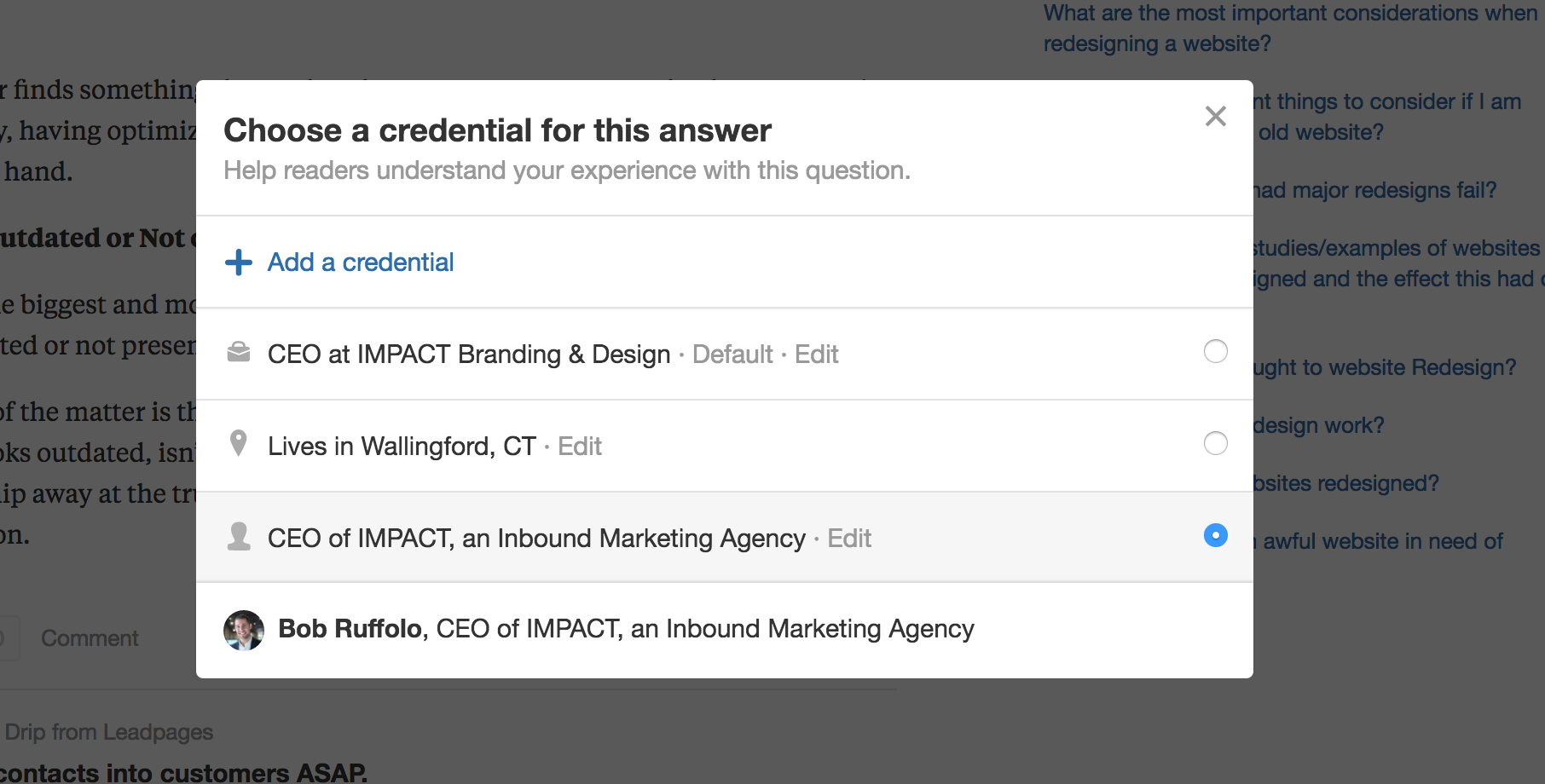
Once you’ve selected “edit,” you’ll be brought to another box where you can enter in your new bio, and click “save.” If you want to change your bio everywhere, you can click set as default.
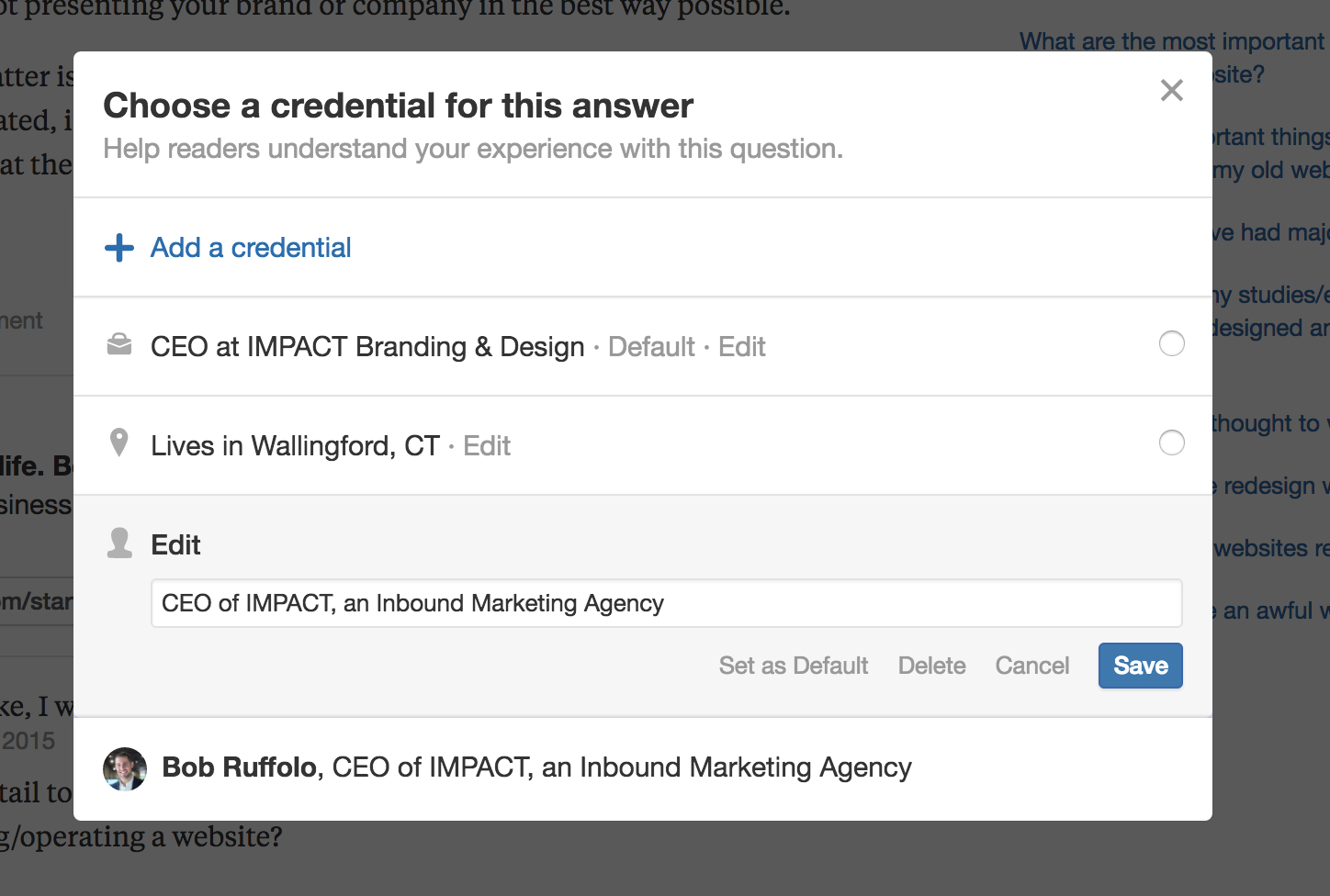
Add Links in Your Description: While the description box might be a great place to talk about your expertise and help you generate some SEO value, it can also be an opportunity for you to drive more clicks to your website.
Quora enables you to include in-line hyperlinks in your description but use these strategically and sparingly. You want the links to be relevant and useful, for example, guiding people to your homepage, blog, or social media accounts.
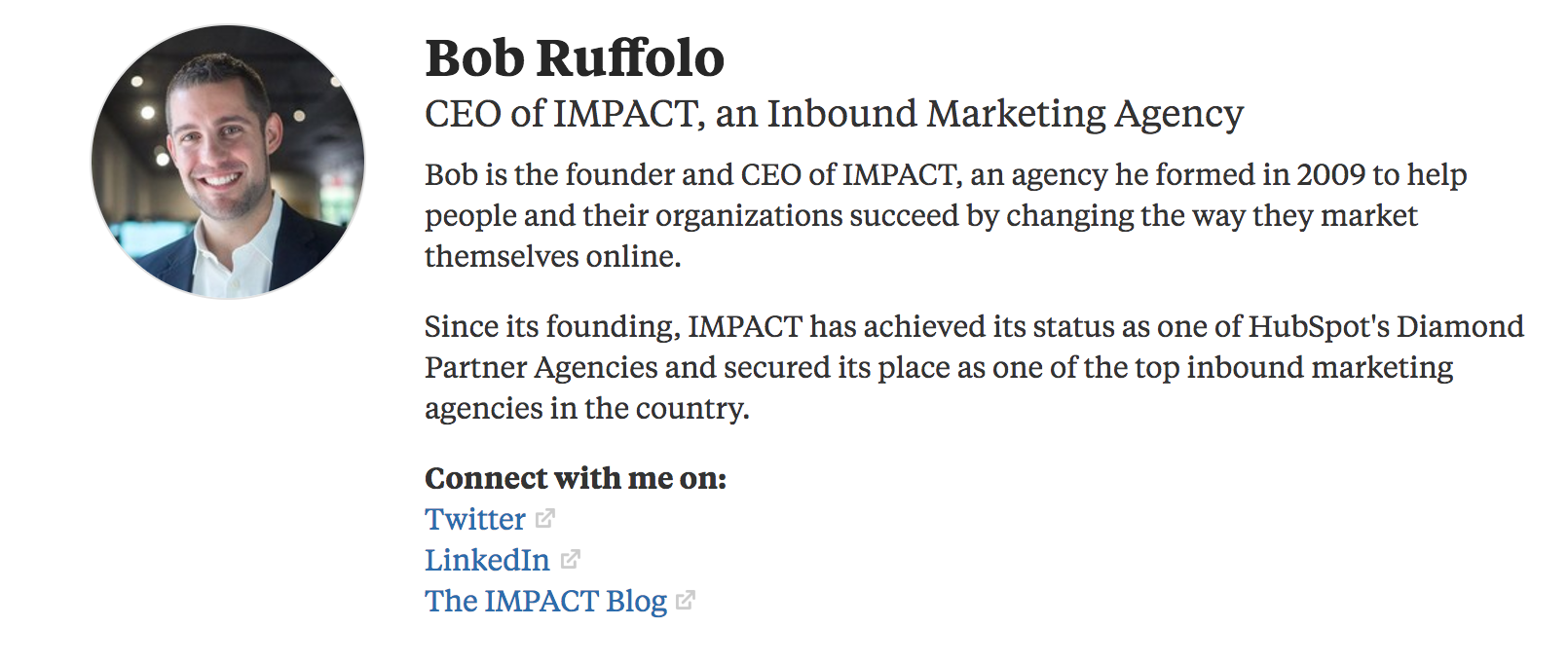
Keyword Optimize Your Headline: Like LinkedIn, your headline is a great opportunity to optimize and get found for particular industry keywords.
In the image above, for example, Bob uses his headline to incorporate, our brand name as well keywords like inbound marketing and inbound marketing agency.
Keep in mind that Quora will restrict your headline to a 50 character limit, so keep it short. Like Google search results, you don’t want your headline to include the dreaded ellipsis.
Create Your Brand Name as a Topic: If you’re a SaaS company or simply a company that sells a service or product, creating a topic specifically for your brand is a great way for people to ask and answer questions about your company or product/service.
Here’s an example from HubSpot.
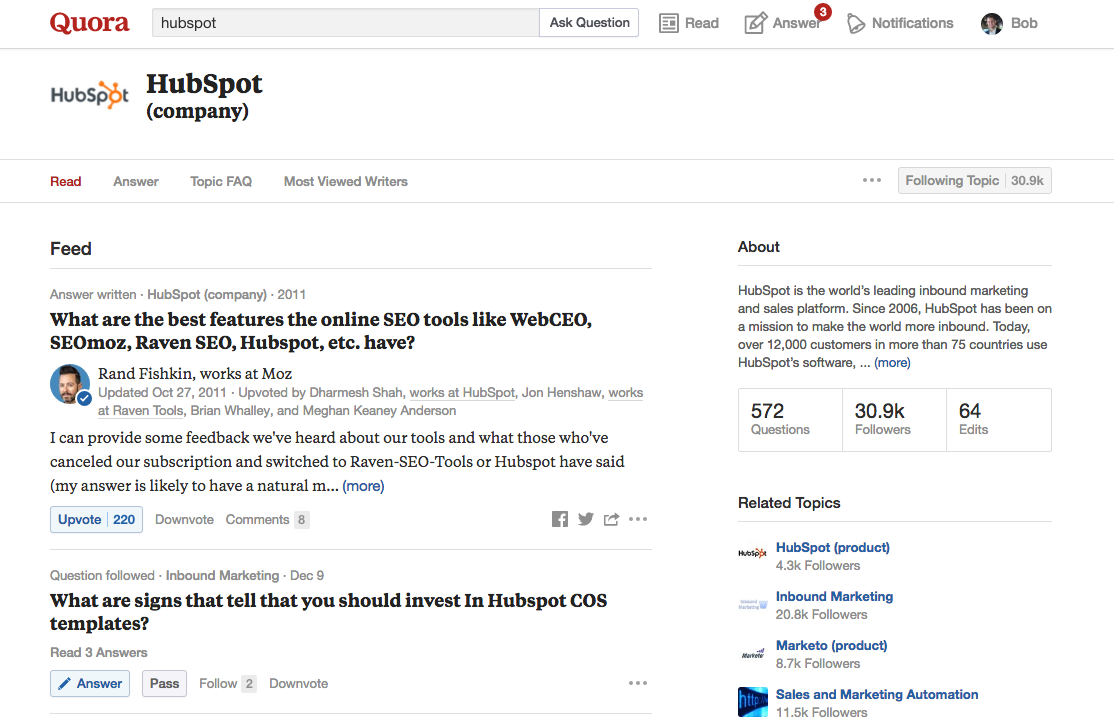
2. Find Relevant Questions
Once your profile is optimized, it’s time to start contributing!
How to Find The Right Quora Questions to Answer
There are millions of questions on Quora, but how do you know if you’re answering the right ones?
No one wants to spend time and effort on answering questions that are old or irrelevant and unfortunately, this is where most people face challenges.
For those of you that don’t know, the more upvotes your answers have on Quora, the higher your answers will display in that questions feed.
For example, if you’re looking to answer questions about inbound marketing, you’ll want to search for that term in the query bar and then select the topic when it appears.
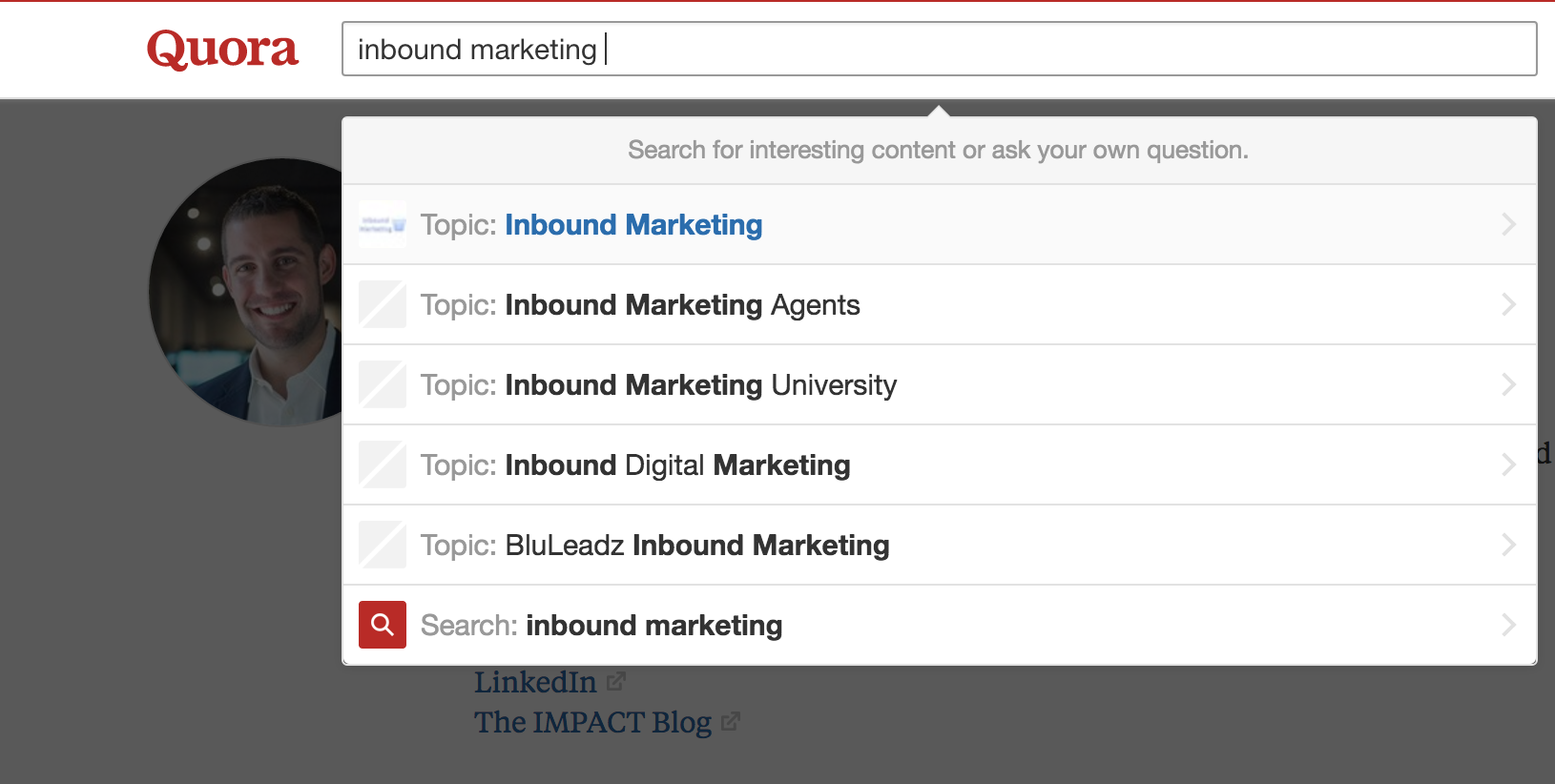
When you’re in the feed to that topic, select Topic FAQ (frequently asked questions). This will give you the top questions that are being asked within that subject.
This will give you a smart jumping off point.
Don’t be discouraged if the question has already been answered by hundreds or even thousands of people. If a large portion of people are viewing the question, and your answer is providing value, you have the opportunity for those viewers to upvote your answer and move it towards the top of the feed.
Another, way to find relevant questions is to type in your keyword into the query box and select search. And then filter those results based on questions that have been submitted within the month.
Look for Evergreen Questions With More than 1,000 Views
Once you’ve identified your topic’s FAQs, you’ll want to look for questions that have received more than 1,000 views and ones that have been posted for at least a week.
The idea here is that the more views a question has, the more exposure your answer might get.
You can find the stats for each question in the right sidebar, underneath Question Stats. Use the image below as a reference.

Since Quora doesn’t all you to filter questions by views, you may have to spend some time manually searching for questions that match that criteria, however, in the long run, it will pay off.
Turn On Notifications!
In order for you to continuously increase brand awareness on Quora, you’ll want to receive notifications of new relevant questions to your areas of expertise. To receive those notifications, you’ll want to follow topics that are relevant to your industry.
Once you’re getting those emails, don’t stop there. When it’s appropriate, you’ll want to provide answers to those questions. You can do that by using content you’ve already created.
3. Answer Relevant Questions
Once you’ve found the questions you’ll want to answer, the quickest and easiest way that you can answer questions by utilizing content you’ve already created.
In other words, pull content directly from a relevant blog post.
Rather than posting the entire article, use large snippets from a blog post to answer the question and include a link back to the full piece on your site.
When doing this, you’ll also want to add a tracking URL to the blog post throughout your answer (where it makes sense, of course). Here’s how you can make a tracking URL in HubSpot.
While your answers don’t necessarily need to be the length of a blog post. You’ll want to add as much information as you possibly can without giving away the entire answer. Give them bits and pieces, while directing them back to your original piece of content.
You can also keep your answers short and to the point; The point is to add value.
Also, whether your answer is long or short, you’ll want to direct viewers back to your website where they can find more information pertaining to their question. As you saw from our results, there’s no guarantee that people actually click through back to your site, but even if they don’t, Quora has high site authority and any links from it coming back to your pages, can only help their rank at the end of the day.
Requested Answers
If you’re actively answering questions in certain topics, you may eventually find that people will even start asking you to answer specific questions -- and that’s great. That means people are finding what you say useful and they beginning to trust your expertise.
You can easily find these questions in your profile under “Asked to Answer,” on the left-hand side.
4. Connect With Other Quora Users
As with any other social media platforms, you’ll also want to connect with other users on Quora.
You can find people to connect with on Quora by:
- Looking at the top answers and followers of a particular topic.
- Creating and contribute to boards on topics in your industry.
- Sharing content off and on Quora to create valuable information that other Quora users will want to follow.
5. Review Your Analytics (Regularly!)
As with any marketing activity, you’re executing, it’s important to actively review your analytics to identify areas for improvement.
Not only can you view the analytics for all of the questions you’ve answered, but for each question individually. Within those analytics, Quora provides you with how many times your answer was viewed.
With that information, you’ll be able to see what questions are generating the most views and what areas need to be optimized and improved.
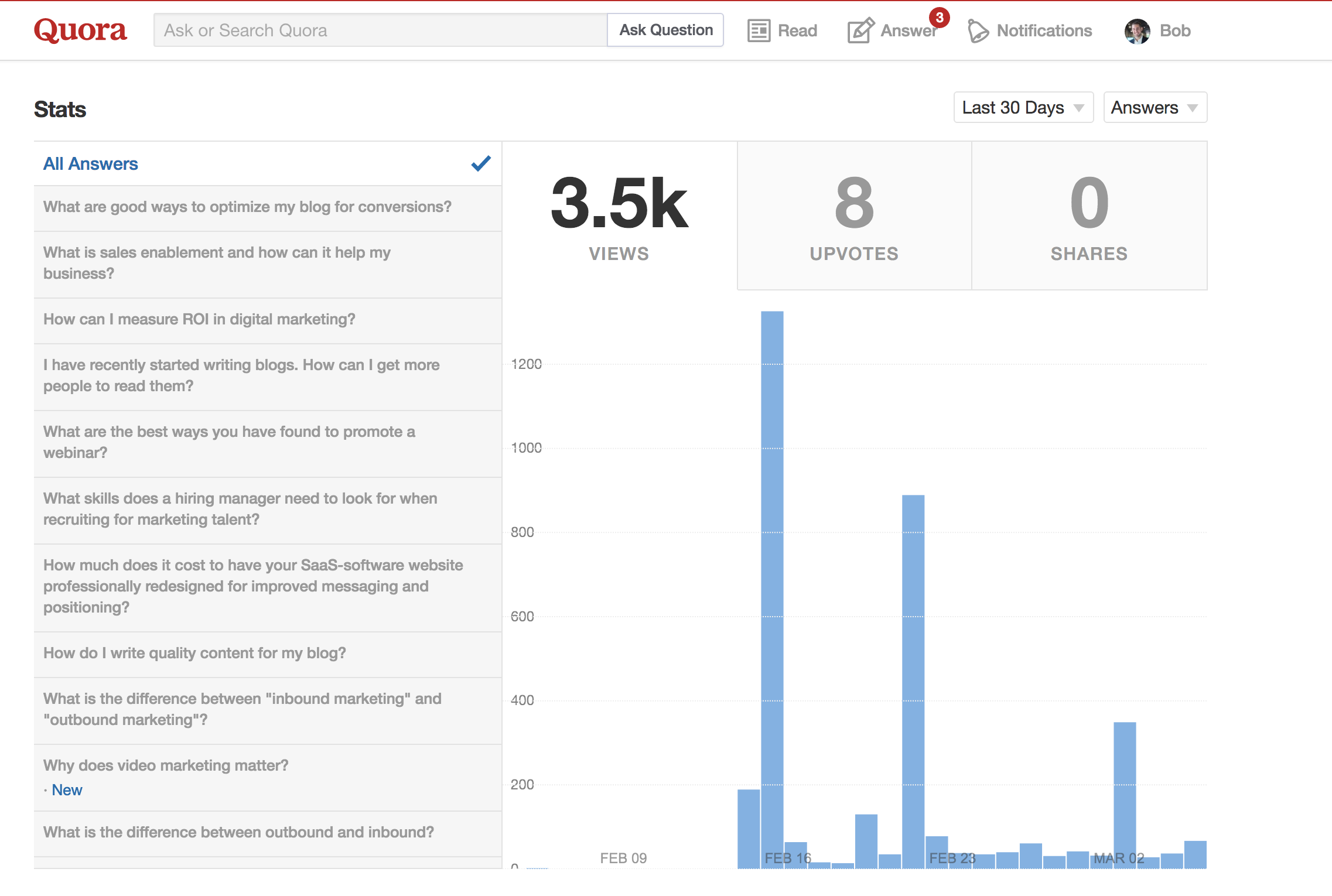
Have you used Quora marketing to generate traffic or increase your brand? I’d love to hear about your experience.


Order Your Copy of Marcus Sheridan's New Book — Endless Customers!